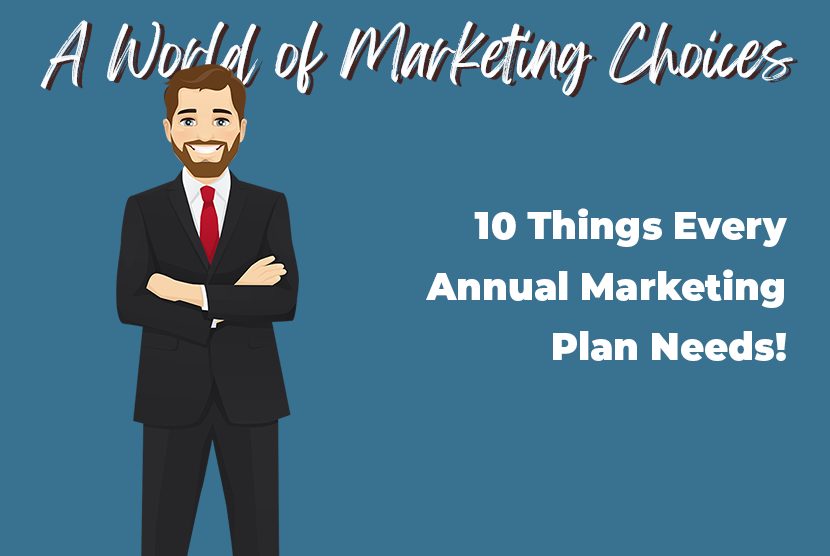
10 Things Every Annual Marketing Plan Needs
It's been said that whenever someone doesn't know where they want to go, any road will lead them astray. This principle certainly applies to the business world, especially the marketing industry. To receive the highest possible return on any ad spend, companies must plan with a clear destination goal in mind.
Many companies develop a marketing plan for the year to give their campaigns and initiatives a clear sense of direction. What elements should your annual marketing plan include? Let's discuss ten components to make it successful.
1. Business goals
You’ll write your marketing plan after your business plan. So, make sure you keep those goals and objectives in mind. For instance, getting more likes and comments on your social media posts is only helpful if one of your business goals is increasing engagement and generating leads. Remember, the best business and marketing goals are SMART (Specific, Measurable, Attainable, Realistic, and Timely).
2. Target audience
Your marketing plan should take into account your intended audience. Before jumping into a campaign, take time to learn about their needs, preferences, and behaviors. The best way to reach young adults with social media is TikTok before Facebook. Why would they choose your brand over a competitor's brand? Answering these questions will help ensure your marketing efforts are tailored to the right people, conveyed at the right time, and delivered correctly.
3. Budget
Not even huge blue-chip companies have limitless resources, so developing a realistic marketing budget for the year is crucial. Be as detailed as possible when creating your budget. Outline the resources you'll need for each proposed marketing campaign, including advertising, promotions, event marketing, content creation, etc. Unexpected costs can arise, so it’s a good idea to leave a cushion in your budget.
4. Marketing mix
Your annual marketing plan should include the specific marketing tactics to reach your target audience effectively. This may include social media marketing, email marketing, content marketing, and paid advertising.
If you're working with an agency, ensure they can provide the marketing mix you need. For example, Mid-West Family Madison offers a range of solutions to help your business grow, from advanced digital marketing techniques like SEO and web development to live event marketing and radio sponsorships.
5. Timeline
Every good marketing plan should include a timeline outlining each campaign's key milestones and deadlines. A well-planned calendar will make sure your campaigns start on time, stays on target, and keeps your team accountable.
6. Metrics and analytics
Key performance indicators (KPIs) are "specific, numerical marketing metrics that measure progress toward a defined goal with marketing channels." It's important to define your KPIs for each campaign—website traffic, generated leads, conversion rate, etc.— after all, what you don’t measure can't be tracked or improved!
7. Competitor analysis
As the old Sicilian proverb goes: "Keep your friends close and your enemies closer." It's good to keep an eye on the competition as part of your marketing plan. That way, you can effectively imitate their strengths, exploit their weaknesses, and perhaps even adjust your marketing strategy in response to their newest initiatives.
8. Brand messaging
How do you want consumers to perceive your brand? For example, do you want to be known as the company with the lowest prices, the highest quality products, or the best customer service? Understanding the value proposition you offer customers is crucial to molding your marketing messages around your “a-ha” moments.
9. Marketing roles and responsibilities
If you have an in-house marketing team, clearly define each team member's roles and responsibilities. This is the key to ensuring your resources are spent wisely and it keeps your team accountable for the performance of each campaign.
10. Contingency plan
No marketing plan accurately predicts the future 100% of the time. Unexpected challenges may arise, such as a worldwide pandemic or just a drop in the market. For this reason, it's essential to include a contingency plan (or plans) as part of your overall marketing strategy. You want your business to remain flexible to meet unforeseen developments and stay competitive.
Partner with Mid-West Family Madison for your marketing needs
Whether you need help developing your yearly marketing plan or already know what needs to be done and just need help, Mid-West Family Madison may be the perfect partner for your business. Our team of experienced professionals can assist with marketing planning and execution all year round. We are skilled in every form of marketing and advertising, including SEO, social media marketing, paid display, broadcast radio, content creation, etc.
Reach out to us today to learn how we can help your annual marketing plan become a smashing success!



